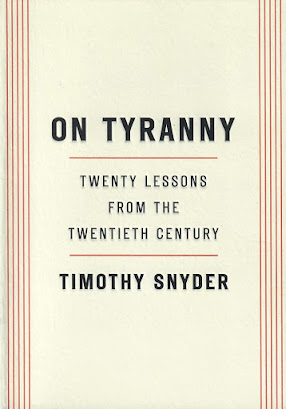 Timothy Snyder wrote
his book, On Tyranny: Twenty Lessons From The Twentieth Century
(Tim Duggan Books, 2017), in the early days of the Trump administration. If anything, Snyder’s dire predictions about
the rise of tyranny are more apparent now.
The situation is more desperate, the threat to our democracy more precipitous.
Timothy Snyder wrote
his book, On Tyranny: Twenty Lessons From The Twentieth Century
(Tim Duggan Books, 2017), in the early days of the Trump administration. If anything, Snyder’s dire predictions about
the rise of tyranny are more apparent now.
The situation is more desperate, the threat to our democracy more precipitous.
Snyder, in 126 pages, meticulously documents the evil of tyrannical leadership. He cites Aristotle, who warned us that inequality would bring instability, and Plato, who “believed that demagogues exploited free speech to install themselves as tyrants.” The ancients, as well as the Founding Fathers, called these threats tyranny. Snyder writes, “They had in mind the usurpation of power by a single individual or group, or the circumvention of law by rulers for their own benefit.” Fascism and communism are responses to globalization, Snyder tells us. “Fascists rejected reason in the name of will, denying objective truth in favor of a glorious myth articulated by leaders who claimed to give voice to the people.”
We have become so violently partisan in this country that Congress and the White House are hopelessly gridlocked, clinging to their power and preventing anything from getting done while simultaneously attacking democratic institutions. We must defend our democracy and its institutions from Americans “who would exploit its freedoms to bring about its end,” Snyder writes. No single party should have all the influence and power in a government. Parties working together through philosophical differences to reach a consensus, that is democracy, not rule by any one party or person.
We must protect those who lack the power to defend themselves. We have a responsibility to our country and our global community to work for justice and an end to oppression. Snyder writes that “When the men with guns who have always claimed to be against the system start wearing uniforms and marching with torches and pictures of a leader, the end is nigh. When the pro-leader paramilitary and the official police and military intermingle, the end has come.” These militias are mercenaries paid to enact violence on behalf of the government. Prisons are run by corporations. The violence inherent in our nation is now privatized, a dangerous situation. Trump and his security force often incite the crowd at his rallies to attack those who dissent, or to threaten journalists as an enemy of the people. He instigates nothing less than mob violence against those who disagree with him and his message and he legitimizes such violence. He has continued to do this even after he was sworn into office.
It is clear that the single greatest response to tyranny is the individual working in concert with other individuals to “form a more perfect union.” We must be willing to act ethically, stand up and stand out, and as the great John Lewis said, get into good trouble for the sake of our democracy. This means considering how we think, the words we use, the way we bear witness and offer shelter and support to others. We must take ethical and moral action in the face of tyrannical evil.
Snyder strongly advises us to read books, especially the totalitarian fictions of the past like George Orwell’s 1984 and Ray Bradbury’s Fahrenheit 451. These novels offer a blueprint for what our future will look like if we do not stand up and fight back against tyranny. However, this does not mean to retreat into fiction. These novels have a way of clarifying the situation and making real the ultimate outcome of the whittling away of our rights and freedoms.
Snyder breaks down Trump’s method of operation. He is openly hostile to verifiable reality. He repeats his lies and the infantile names he creates for his opponents which are often more appropriately assigned to himself. He promotes magical thinking—the coronavirus will magically go away. He claims to be the only one to solve problems, asking the American people to have faith in him even when he has no plan to right the ship of state, nor has he displayed concern for anyone else but himself. He is the very definition of a demagogue.
Bottom line, our president is a nationalist, which, as Snyder writes, “is not at all the same thing as a patriot. A nationalist encourages us to be our worst, and then tells us that we are the best.” Just exactly when was the “again” in “Make America great again?” Funny that the exact temporal location is never identified in all of Trump’s rhetoric. The past was never as great as we think it was. This is the reason we must know history and continue to teach it to our children. “To understand one moment [in history] is to see the possibility of being the co-creator of another,” Snyder writes. “History permits us to be responsible: not for everything, but for something.” That something is our future, which is very much at risk in the face of ubiquitous tyranny and oppression.

No comments:
Post a Comment
I would love to know who is commenting. Therefore, please use the selections below to identify yourself. Anonymous is so impersonal. If you do not have a blog or Google account, use the Name/URL selection. Thanks.